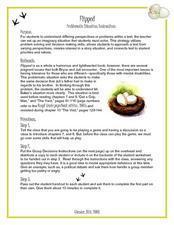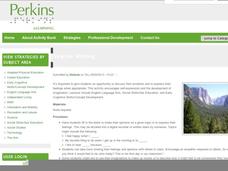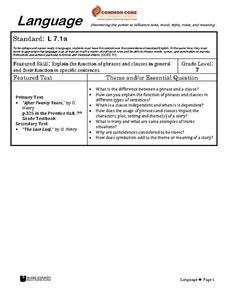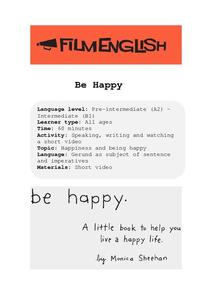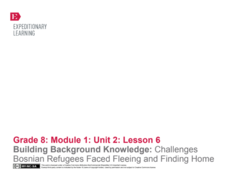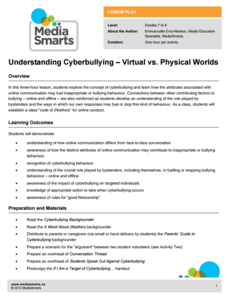Curated OER
Socratic Seminar Questions/Observation
Prepare participants for a Socratic seminar by asking them to not only design questions for the discussion, but to also observe an assigned partner during the seminar. A great way to encourage student-led discussions.
Road to Grammar
100 Ice-Breaker Questions
What if you could ease your English language learners into class with engaging questions? You can do just that with these questions. The questions, designed to prepare learners for working with English, are grouped by topics, such as...
Penguin Books
An Educator’s Guide to Ruta Sepetys
Historical fiction novels give readers a chance to step into someone else's shoes. An educator's guide from Penguin Common Core Lesson Plans provides resources to accompany three historical fiction novels written by Ruta Sepetys: Between...
Brigham Young University
Flipped: Problematic Situations
An activity based on the young adult novel Flipped, groups work to make the same difficult decision a character in the novel faces. Each group is given the same scenario about caring for a mentally disabled brother personally or putting...
Speak Truth to Power
Jamie Nabozny: Bullying: Language, Literature and Life
Class members identify bullying in contemporary texts and role play how they might change those scenes to examples of anti-bullying. They then re-define their initial definitions of bullying and discuss what they would like to see as...
Curated OER
Adverbs of Frequency Gender Policy Discussion
In this grammar worksheet, students, working with a partner, add frequency expressions/adverbs to make twenty sentences more interesting and intriguing.
Perkins School for the Blind
Circle Time
Oftentimes children or teens with one or more disability are reluctant to participate in whole-group activities. Foster good participation, verbal expression, and social skills through daily circle time activities. Each day you and your...
Perkins School for the Blind
Encouraging Students Who are Blind or Visually Impaired to Express Their Feelings and Explore Imagination
Being expressive in a creative, empathetic, or imaginative way is not only fun, it builds good pre-writing and communication skills. Learners with visual impairments have a roundtable discussion session where several sentence frames are...
Curated OER
Analyzing Two or More Nonfiction Texts
How does recognizing the author's purpose help you draw conclusions about a topic? Using two articles (both are attached), learners brainstorm why each author wrote each article. Are their purposes similar or different? Learners use a...
New Brunswick Department of Education
Personal Development And Career Planning Curriculum Grade 9/10
What is the difference between a proactive person and a reactive person? Scholars explore the topic, and many others, with helpful lessons, discussions, role play activities, and games. Each activity supports one of the key principles...
Wake County Public Schools
Language
Have your class doing everything from reading literature, analyzing literary devices, identifying independent and dependent clauses, discussing, and writing creatively with the rich resource found here. After a mini lesson on independent...
Perkins School for the Blind
Personal Information
"Hi, how are you? My name is___." Seems simple enough but it's not always that easy to recall and relate factual information about yourself. Learners with multiple disabilities practice memorizing and relaying personal information about...
The New York Times
News and News Analysis: Navigating Fact and Opinion in the Times
Help your class understand the difference between fact and opinion by exploring the New York Times homepage and articles. In pairs or small groups, pupils complete a scavenger hunt, answering the provided questions. Next, discuss the...
Film English
Be Happy
What makes your pupils happy? Find out with a lesson centered around this theme. Class members come up with things that make them happy and write about them in preparation for quick group project. Learners watch and discuss a short film...
EngageNY
Building Background Knowledge: Challenges Bosnian Refugees Faced Fleeing and Finding Home
What challenges did Bosnian refugees face as they fled home during the Bosnian War? Scholars read an interview with four refugees and identify common themes that connect the universal refugee experience. They also engage in a...
EngageNY
Close Reading: Fishbowl Comparing Atticus and Mr. Gilmer (Chapters 17-19)
Class members participate in two circle group discussions to compare Atticus and Mr. Gilmer in chapters 17-19 of To Kill a Mockingbird. They use a note-catcher to guide their thinking. For homework, readers begin looking at chapters 20-21.
EngageNY
End of Unit Assessment: Making Connections between Song Lyrics and Texts
For the end-of-unit assessment, scholars engage in small group Socratic seminars to connect the lyrics of two songs to texts they read and studied. They discuss how the songs "Ain't Gonna Let Nobody Turn Me Around" and "Lift Every Voice...
Azar Grammar
Song Lessons: Father and Daughter
Paul Simon's "Father and Daughter" offers language learners and native English speakers an opportunity to study adverb, adjective, and noun clauses.
Curated OER
Sequencing
Are you looking for a way to teach sequence of events in your narrative writing unit? Bring this lesson to your middle school class, as it prompts young writers to create a narrative sequence map of events that have happened at school...
Mythology Teacher
Eros and Psyche: Part 1
With Eros and Psyche, your learners will have the opportunity to combine the art of reader's theater with a study of the ancient Greek gods! This engaging reader's theater script will also serve as a fantastic way for your class members...
Newseum
Photo Ethics: Diversity
With the advent of photo manipulation software, it is possible to digitally edit a photograph in a way that is virtually undetectable. The question asked of young journalists in this lesson is whether such manipulation is ethical. Groups...
EngageNY
Rereading and Close Reading: Communism, “The Vietnam Wars,” and “Last Respects” (Pages 85 and 86)
What might a papaya symbolize? Using the resource, scholars look for examples of symbolism in the novel Inside Out & Back Again. They also participate in a silent discussion called a Chalk Talk, writing their responses to a...
Media Smarts
Understanding Cyberbullying — Virtual vs. Physical Worlds
Spend a few days discussing cyberbullying with an engaging lesson plan. Opening discussion questions get the conversation started while quotes and articles continue thoughtful dialogue. Small group activities and role-play scenarios...
EngageNY
Inferring About Character: Atticus (Chapter 5)
As part of their study of Harper Lee's To Kill a Mockingbird, class members participate in a silent discussion of the novel using a Chalk Talk chart. They then respond to the teacher's questions by writing their thoughts on the chart....
Other popular searches
- Group Discussions
- Titanic Group Discussion
- Group Discussion Format
- Whole Group Discussion
- Small Group Discussions
- Group Discussion Activities
- Brief Group Discussion
- Short Group Discussion
- Chapter 6 Group Discussion
- Topics Group Discussions
- Business Group Discussions
- Brief Group Discussion Topic





